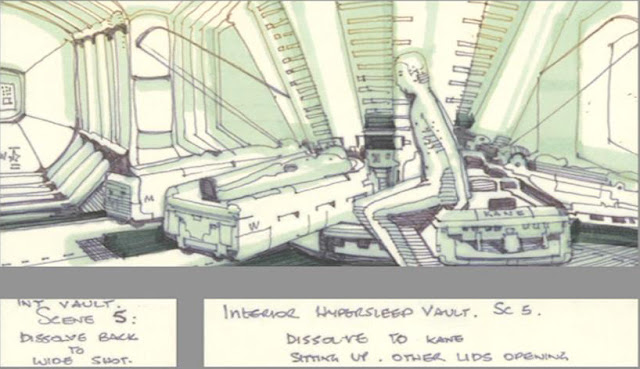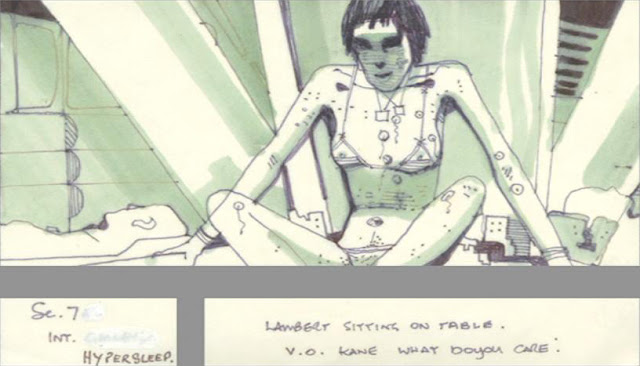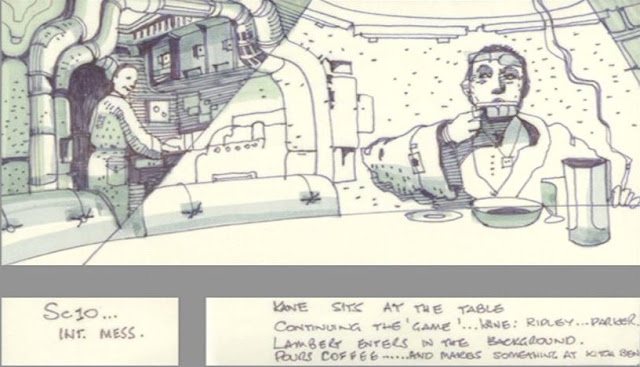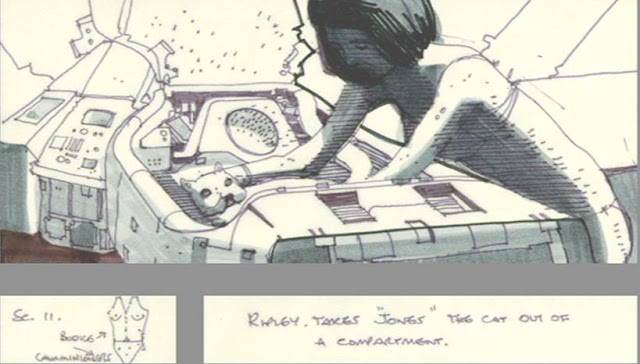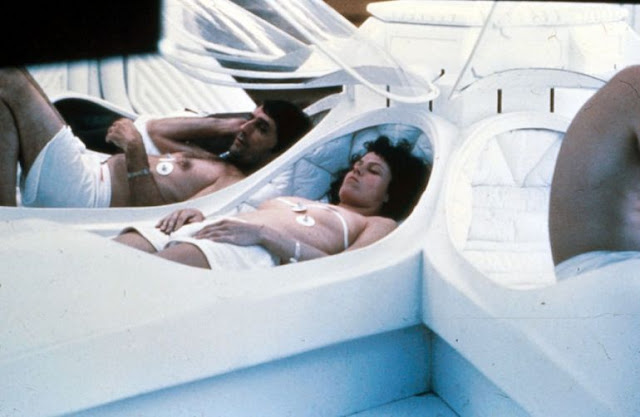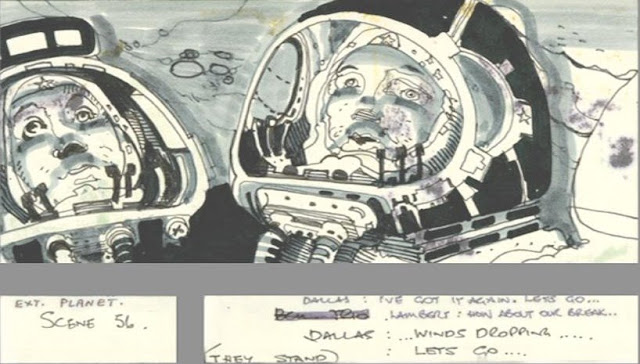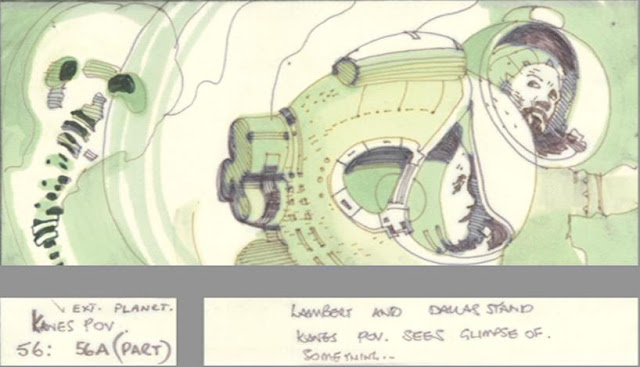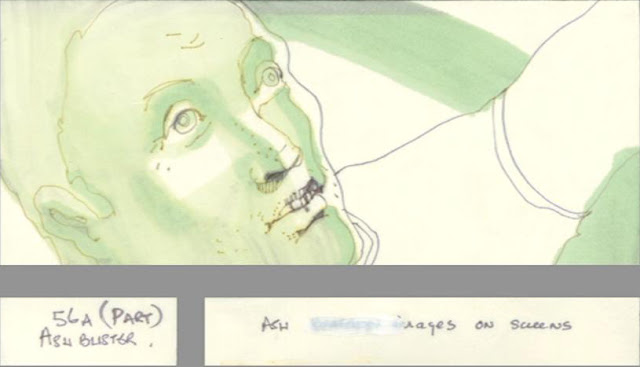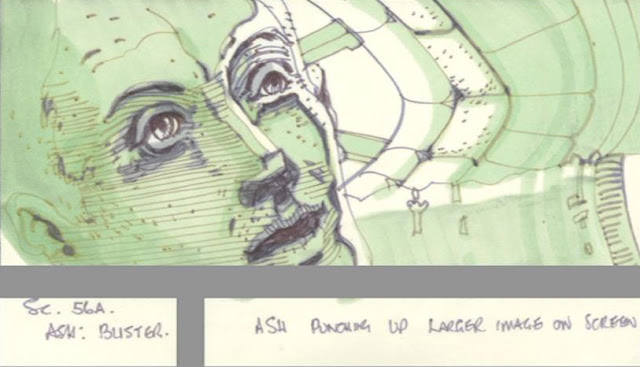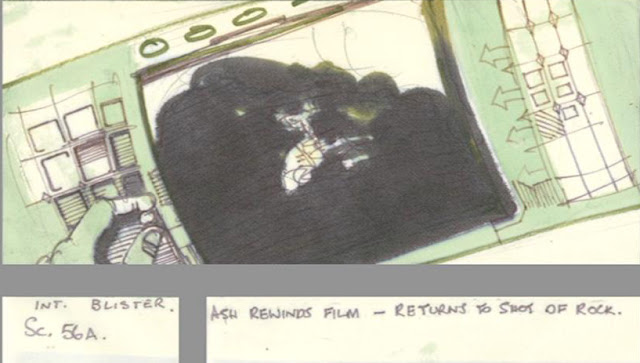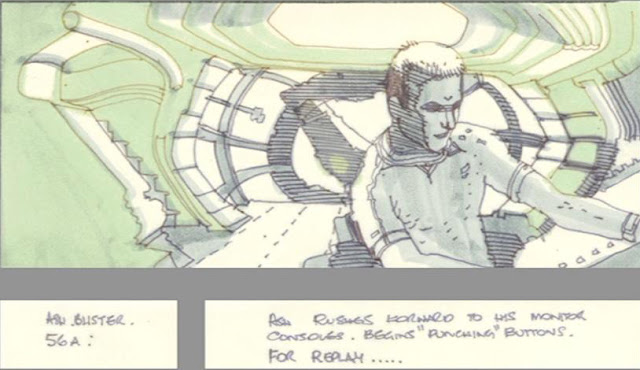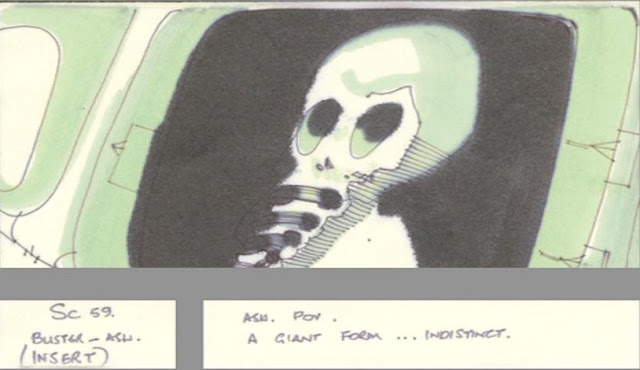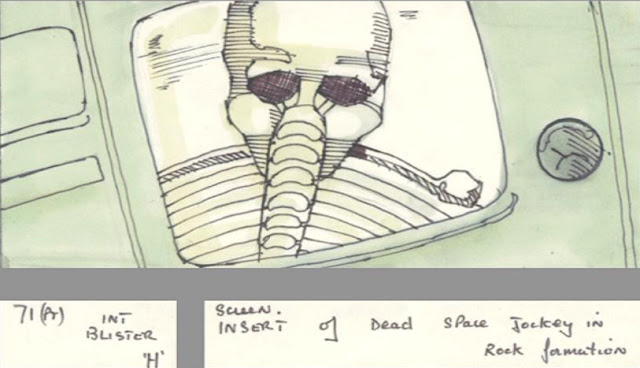Gordon Carroll and David Giler have been associated with the film industry for many years. Carroll, 51, began his career in sales back in the fifties. He soon found himself a producer on such projects as How to Murder Your Wife, Cool Hand Luke, The April Fools, and Pat Garrett And Billy The Kid.
Giler, 36, began his career early in life thanks to a boost from his father, Bernie Giler, a noted film and TV writer. A scriptwriter for such television shows as The Man From U.N.C.L.E. and Kraft Theater, Giler moved to the screen side in the seventies writing Myra Brekenbridge, The Fun With Dick And Jane and both writing and directing Blackbird.
FF: Why was the scene where Ripley finds Dallas inside the alien's cocoon cut from the final picture?
CARROLL: We were under a lot of budget pressure and schedule pressure at the time -- we had to postpone it. So when we got to it we never did get it right. So we dropped it. Although we liked the idea of that scene because it tells you just one more thing about the alien -- about it's cycle and what it uses people for.
GILER: But I think we were right in dropping it. Although I've always loved that scene.
FF: Was the alien itself filmed in slow motion in certain scenes?
CARROLL: No, it wasn't. It just looked that way. It was very slow but it was the actor himself.
FF: Toward the end of the film, as Weaver is heading toward the space shuttle, the action seems a little confusing. First she sees the alien in a corridor and then when she comes back it's gone.
CARROLL: Whether you get it it the first time around -- that's the only corridor that leads to the shuttle. The idea is that the alien is between her and the shuttle craft. I don't know whether it still comes across.
FF: Does it make any difference?
CARROLL: Not really. When she comes back up it's gone. And when she gos back inside the shuttle craft it's not there, although in a bio-mechanized sort of nature it begins to grow back into the machinery. Sort of nesting again. I don;t know. I think it's possible there's some confusion there.
FF: Is that why the alien seems to dawdle and Weaver had time to get into a space suit. That it's starting to die?
CARROLL: I think it's possible that anything that grows that rapidly has a very short life span. So it may indeed be getting ready for the old age home (laughs).
FF: How long was your shooting time?
CARROLL: Actually, excluding the models, 16 horrendous weeks.
GILER: And then months of model shooting. We still suspect there's a unit still shooting some place now (laughs).
FF: How much of the film was trial and error?
CARROLL: Most of the accidents were good accidents and there was a lot of luck involved.
GILER: (To Carroll) Did we have one model shot that we didn;t make more than once?
CARROLL: No (laughs). Part of the idea was to do the model shots without that harsh light -- you know, that you get in 2001 and Star Wars and so fourth. There's very few shadows in space apparently. In our film we wanted murky, dark, shadowy, ominous spacecraft -- giant size and they rumble -- that sort of idea. Also, because of the lack of equipment at the time we didn't have the luxury of shooting with a VistaVision camera -- where you get a larger size negative. So when you marry that image into another image you don;t lose as much because you're bringing it down in size, And it makes the image more dense. We just didn't have VistaVision...they weren't available.
GILER: Which made it more difficult. And also we didn't have the computer controlled tracking thing that George Lucas developed. We came up with something very close. But our margin for error was not as wide as George had. He could do his over and over again rather quickly, and we couldn't.
CARROLL: It took forever to get every one of those shots.
FF: Are either one of you science fiction fans?
CARROLL: No.
GILER: No.
CARROLL: It's always been a question in my mind of the degree to which Alien is a science fiction film. It is, by definition, but I would guess the weight of it is essentially in that classic other dimension which is horror or terror and suspense.
GILER: Science fiction is just a background. I mean in the same way the West is a background. This kind of story -- a traditional terror/horror kind of story -- is set in a science fiction background.
FF: Have either of you seen Dan O' Bannon's Dark Star?
GILER: Sure.
CARROLL: Yes, after we bought the script.
FF: There had been talk that Alien would receive an x rating.
GILER: We cut the scenes where Sigourney and the monster would have made it an x (laughs).
CARROLL: We never intended it to be a PG movie and we never thought it would be an x.
FF: How do you feel about kids going to see it?
CARROLL: Children who have seen it have not been affected in any adverse way.
GILER: The ones who are affected by the movie are, I think, adults -- ladies over 40 have a tough time with the movie. Kids love it.
FF: Basically, there is very little visual violence in Alien. It's mostly left to yuor imagination.
CARROLL: Yeah, and also the anticipation. Harry Dean Stanton going after the cat for example. And Tom Skerret in the air shaft. We tried to stretch that band as much as we could. Because the anticipation is as thrilling as the movement, you know, even more thrilling.
FF: How many model casts were there of the alien?
CARROLL: Technically, there were two different size suits worn by three different people -- two stuntmen and Bolaji Badejo, the native of the Gold Coast. He's seven-foot-one, has these fantastic arms that stretch from me to you and he's got legs that go to the ceiling. And the extraordinary thing is he's amazingly strong. Yaphett Koto kept saying "I could take that guy in one punch. I gotta get that guy." And then he was really steamed. So one afternoon the two of them went at it. And Bolaji just said "Hold on a second" and he literally lifted Yaphet with these spider like arms. And there was no further discussion from Yahpet.
FF: Why did Yaphet want to start a fight with Bolaji?
CARROLL: Well, what happened was when we did the birth scene, it really did change everybody's idea about their character. It gave the actors a different concept of their characters. They were no longer slightly removed form the film. Now it was real. And Yaphet, who who had at first intended to play his part a bit differently, was just absolutely terrified by the idea of the alien and literally wanted to kill it. And he continued that way through the rest of the shooting. That is the way he played his character -- he really felt that he had to go after it and kill it. He just couldn't conceive of his character not doing that.
FF: He really got wrapped up in his character?
CARROLL: Yes. He felt that if he had really experienced anything like that, the only thing he would think about was killing it -- he wouldn't think about anything else.
FF: What character do you feel played upon the audience's reactions best?
CARROLL: Probably Sigourney Weaver as Ripley, but Veronica Cartwright comes in a very strong second. Veronica cracks rather early in the picture. She maintains herself right on the edge of hysteria. And I thins he plays what might happen to most of us. I know I would be right on the edge of hysteria, and probably be acting a little bit like Weaver myself.
FF: What about the twist of Dallas getting wiped out so early. Who would have thought the leader was one of the first to go?
GILER: It works just like Janet Leigh in Psycho. An audience's expectations are patterned in a certain way. You know this guy's gonna' be around for the whole movie. It's just a question of how and what. So we thought people would get a nice big shock if Tom went. He goes -- and he's gone. Sorry. Now what?
FF: Are either of you headed for more science fiction-type films?
GILER: We talked about a sequel.
FF: Then there is talk of sequel?
GILER: Oh, yeah.
CARROLL: We don't have any one idea we like better than the rest. But I think it's a very realistic idea.
FF: Will it feature the same alien?
GILER: Probably not.
FF: The company the crew works for seems to be very sinister. Will they be elaborated on more?
CARROLL: That's a possibility. I would think that's one of the things we might do. We also have, for example, the planet and all that. I think that the sequel would have more. I'm not saying necessary of that planet, but of the fantasy of science fiction in terms of design.
FF: How about the twist of Ash turning out to be a robot?
CARROLL: When the head comes off and you see that gap in the neck. I think it's the biggest shock of the film.
FF: He's not an ordinary robot is he?
GILER: Walter Hill and I were writing the script -- we were working the script and we had invented the subplot of this dodging character Ash. And Hill said "I have what I think is a dreadful idea or a really good one. What do you think of this? Suppose, in this part -- whack! his head comes off and he's a robot." "Well, terrific," I say, "lets do that. And we'll put it on a table and then we'll have it talk." So we went back and made the subplot work for that. Actually, at one time I wanted the first words from the robot on the table to be the Kipling poem, "If you could keep your head all about you..."
FF: He was a very organic robot. There were even scenes where he was drinking milk.
CARROLL: Glad you noticed that. First time you see it again it's on one of those temples.
FF: Why does Ash go in convulsions after Sigourney slaps him. Does she loosen his circuits or something?
CARROLL: He started to spin out. He started to go crazy.
FF: What prompted you to make a science fiction film in the first place? The success of such pictures as Star Wars and Close Encounters?
GILER: Actually we stared to get involved with this project about six or eight months before Star Wars came out. I guess the biggest worry was that traditional science siction films had not done up well up to a point. We believed in this project. A nd once Star Wars came out the biggest problem for us was the competition of the technical excellence which they achieved. We never felt we were in any danger of plagiarizing mainly because the story is so different from Star Wars. The same thing with Close Encounters. The little kid in Close Encounters is named for me. He's called Giler. I was close to that project and all the stuff. Anyway, Steven Speilgerg called me the other day and said, "George [Lucas] and I we're talking. After all the good work we've done for the space program -- here in one movie you've damned near knocked it off!" (laughs)
FF: Were you worried that people might be dragging their kids to see Alien thinking it's another Star Wars?
CARROLL: No. I agree with you, however, that some people may think it's another Star Wars.
GILER: A friend of mine thought that Alien was to Star Wars what the Rolling Stones were to the Beatles (laughs)
FF: What did Walter Hill bring to Alien?
GILER: Well Walter and I wrote the script. We wrote the script -- it says O' Bannon but we wrote the script.
FF: Would his direction have been very different?
CARROLL: Totally.
FF: What didn't you like about the O' Bannon script?
GILER: It's not a very good script. It had, we saw as writers, potential. It was a whole 165 pages long. The most boring dialogue you've ever heard in your life -- no characters -- no nothing. But it it had great elements.
FF: The book by Alan Dean Foster seems to be much more detailed than the film. Was there any reason you kept the film on a more simple level?
GILER: It's just a question of how much do you explain it. You know, with a movie like this there's a lot of holes in it and you could explain every one of them. But you's have to take time.
CARROLL: The idea was, for example, they say in the future one button will do that worl of 50 today. Well, we have 500 doing the work on one -- exactly the reverse -- we have more lights and what ever because we want to try and make the sense familiar. So that that shocks come form the story and the alien -- so that they don't come out of science fictional devices you have to explain. And we played it very contemporary. The people have contemporary attitudes -- it's like truck drivers in space.
FF: Once last question, with the dramatic success of Alien under your belts, what do you two personally have in store for yourselves.
CARROLL: I have other projects...
GILER: And I'm writing a comedy...
CARROLL: He's really changing his pace (laughs).






















































































